After taking India’s telecom sector by storm, Mukesh Ambani is now ready to extend his domination in India’s retail sector. This after Reliance Retail Ventures Limited (RRVL) announced on Saturday – a subsidiary company of Reliance Industries – that it has acquired almost all businesses of Future Group for consideration of Rs 24,713 crore. These businesses include retail, wholesale, logistics and warehousing business.

Given that Future Group is spread across many promoter entities and subsidiary companies this acquisition deal will go through a bit of a complicated process. One of the key parts of this complicated process is that Future Group will fuse all its subsidiary companies Future Retail, Lifestyle, Future consumer, Future Supply Chain and Future Markets into a single company called Future Enterprise LTD (FEL). FEL will be then sold as a single unit to RRVL.
As part of the agreement, Reliance Retail and Fashion Lifestyle Limited – a wholly owned subsidiary of RRVL – will infuse Rs 1,200 crore in FEL by buying equity shares on preferential basis. It will also pump additional Rs 400 crore in FEL through equity warrants.
Reliance will also take over the entire debt and liabilities of Future Group. However, Future Group’s lenders and vendors may still have to take a haircut, with reports claiming that they may have to take an haircut of nearly 40%. It is estimated that several banks and financial institutions have an exposure to nearly Rs 12,000 crore debt owned by many promoter entities of Future Group. At the group level as well, the company is reportedly saddled with huge pile of debt.
According to reports, lenders are now desperately vying for taking control of Future Group’s real estate properties for payment of their dues. But sources claim that lenders may have to wait bit long before they get their hands on the real estate assets.
There is some ambiguity as what will happen to Amazon’s 49% stake in Future Coupons, which the former had bought last year. In all probability, Amazon may have to make an exit and the exit obviously won’t be a profitable one.
This acquisition will make Reliance Retail India’s largest brick and mortar retail Company and now find itself in a commanding position to take on Radhakishan Damani’s DMart. The deal may also add muscle to JioMart’s ambition to dominate India’s e-commerce strategy and this may bring more competitive pressure for Flipkart and Amazon.
Kishore Biyani – the end of an era
Reliance’s acquisition of Future Group will lead to the complete exit of Kishore Biyani from the retail space. A sober and somewhat sad end for a person who was once hailed as the father of India’s retail sector. Analysts claim that Biyani’s speedy expansion plans, acquisition of several retail assets, building up of several private labels and his over-ambitious FMGC plans led to his downfall.
These ill-conceived strategies that were been carried out with breathtaking speed created a huge pile of debt for Biyani. Most experts unanimously agree that Biyani simply dabbled in too many things and his ambitious diversification and expansion was fueled by massive debt that eventually backfired.
Of course, one may argue that the situation may have been completely different if the pandemic crisis had not broken out. This argument finds resonance partly because Future Group found itself in the middle of debt crisis back in 2012. But a good cash flow coupled with selling of Pantloon Retail – Future Group’s most priced asset – helped Biyani to get out the debt crisis back then.
However, Biyani could not found any such luck this time around, with nationwide lockdown completely squeezing his cash flow and deepening his debt crisis further. With cash flow becoming almost negative, the company found it almost impossible to serve its interest payments. In fact, Future Group’s debt problem had become so critical that had it not been for Covid induced RBI loan moratorium scheme, the company would have been dragged to the insolvency court.
Future Group’s unpaid loans also played a big role in Franklin Templeton’s surprising decision to shut down six debt mutual fund schemes earlier this year. These schemes, as per reports, had exposure to Future Group’s unpaid debt.

